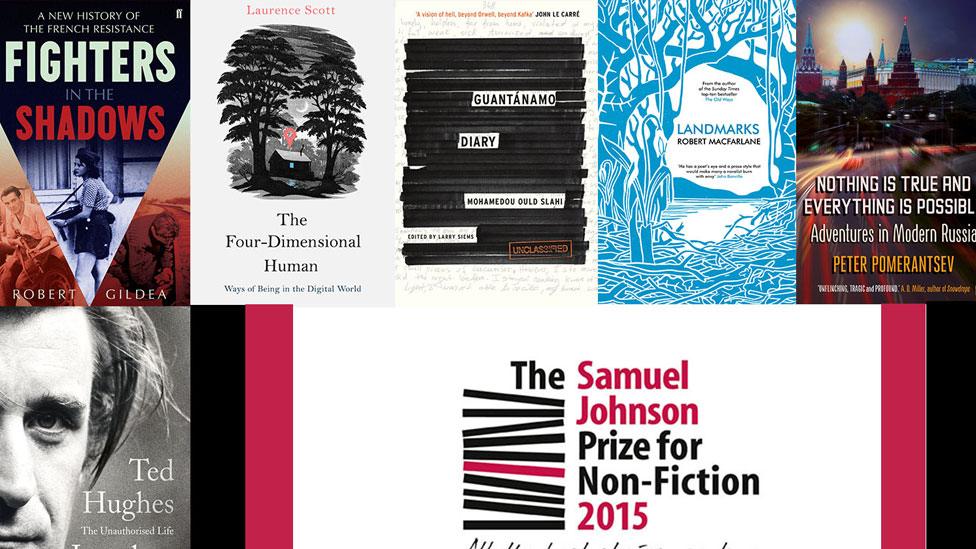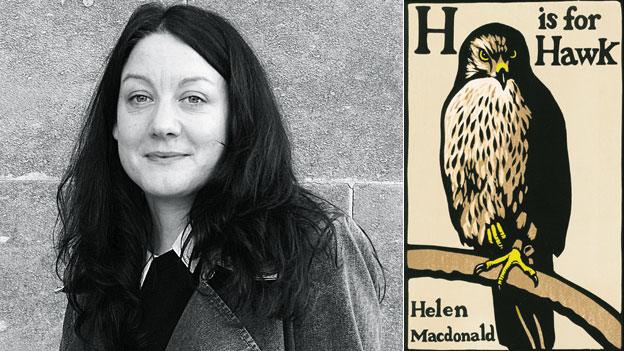Contentious Ted Hughes book makes Samuel Johnson Prize longlist
- Published

The judges had to whittle nearly 200 books down to 12
A book about poet Ted Hughes, which triggered a dispute with his estate, is one of 12 works of non-fiction on the longlist for the Samuel Johnson Prize.
Ted Hughes: The Unauthorised Life by Jonathan Bate features alongside books on history, science and travel.
They include Mohamedou Ould Slahi's Guantanamo Diary and Laurence Scott's The Four-Dimensional Human, about technology's impact on people.
The £20,000 prize was won last year by Helen Macdonald's H is for Hawk.
The prize-winning memoir recounted how the death of Macdonald's father prompted her to follow a childhood dream of training a goshawk. Judges described it as a "book like no other".
This year's longlist also includes Steve Silberman's Neurotribes: The Legacy of Autism and How to Think Smarter About People Who Think Differently.
The book explores the history of autism and why the number of diagnoses has soared in recent years. Unusually, Silberman is a technology writer - whose interest in the subject was sparked by his interviews with Silicon Valley innovators, many of whom had autistic children.
Bate's biography of Ted Hughes attracted attention last year when the author said the poet's estate wrote to tell him, external it was withdrawing its co-operation from his book.
Damon Parker, solicitor for the Ted Hughes Estate, said it had withdrawn support for the book because it feared the author was straying from an agreement to focus on Hughes' poetry and not write a standard biography, and he had not shown the estate his work in progress as agreed.
According to Anne Applebaum, chair of judges for the Samuel Johnson Prize, this year's selection contains "something for everybody".
She added: "We didn't plan it this way but this year's longlist includes pretty much every important non-fiction genre," saying the list should have wide appeal, "whatever your tastes".

Here is the list in full:
Jonathan Bate, Ted Hughes: The Unauthorised Life
Robert Gildea, Fighters in the Shadows: A New History of the French Resistance
Robert Macfarlane, Landmarks
Oliver Morton, The Planet Remade
Mohamedou Ould Slahi, Guantanamo Diary
Peter Pomerantsev, Nothing is True and Everything is Possible: Adventures in Modern Russia
Bruce Robinson, They All Love Jack: Busting the Ripper
Laurence Scott, The Four-Dimensional Human
Steve Silberman, Neurotribes: The Legacy of Autism and How to Think Smarter About People Who Think Differently
Emma Sky, The Unravelling: High Hopes and Missed Opportunities in Iraq
Tim Snyder, Black Earth
Samanth Subramanian, This Divided Island (Atlantic Books)

The judges had to whittle nearly 200 books down to 12, with the the final choices representing "what the judges believe to be the very best of the year's non-fiction writing, from across a huge variety of genres".
Pulitzer prize-winning historian and journalist Applebaum is joined on the judges' panel by Emma Duncan, the editor of Intelligent Life, Sumit Paul-Choudhury, the editor of New Scientist, Professor Rana Mitter, the director of China Centre at Oxford University and Tessa Ross, former controller of film and drama and head of Film 4.
The shortlist will be announced on 11 October.
Update 23 September 2015: This story was amended to add an updated comment from the Ted Hughes Estate.
- Published5 November 2014
